“Come hear this ditty”: Seventeenth-Century Drinking Songs and the Challenges of Hearing the Past
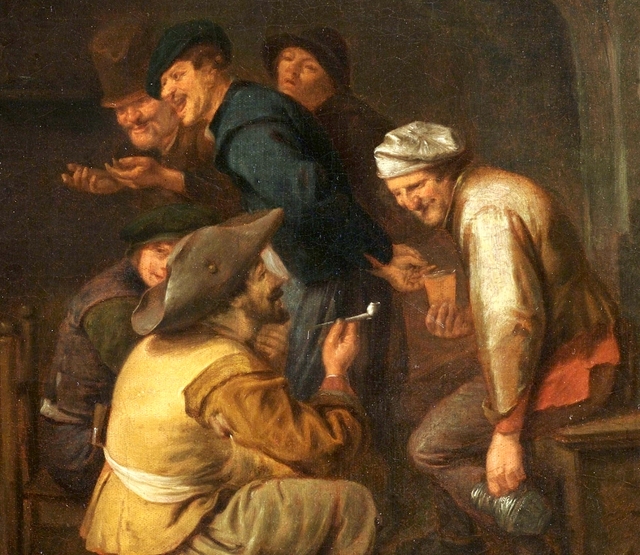
Anonymous, Peasants in the Tavern, Netherlands, oil on panel, 17th century (detail) Wikimedia Commons
In April, 1612, the constables of Calne, Wiltshire, made a desperate plea to their superiors—the county magistrates—to help them reverse a surge in the number of alehouses in their town. Their complaint was that the alehouses “doe all brewe and vie who maye brewe the strongest Ale and thither do resorte all the great drinkers bothe of the Towne and Countrie to spende theyer tyme in idleness and theyer monie in excessivie drinkinge.” When the constables sought to discourage such behavior by charging the men involved with drunkenness, their efforts were unsuccessful, for “all men for the most parte love these cupp companions so well, that no man will take uppon him to be a sworne witnes against any drunkard.”
As this case shows, alcohol played a central role in early modern life, occupying much of the time of both law enforcement officers and guzzling “cupp companions.” Historians have long known this, but until recently it was not considered to be a particularly interesting feature of these past societies. Even the most astute pioneers of cultural history saw it as an inevitable product of life in unstable and harsh worlds, in which people drank heavily to “blot out the horror of their lives.” In this interpretation, drink served as an anesthetic against an oppressive and tedious existence.
This has changed, and historians now see drinking as an activity that is culturally meaningful. Decisions about who to drink with, how to drink, what to drink, how to pay, how much to drink, how often to drink, and how to judge the drinking behavior of others, are thought to provide an insight into the underlying values of a society.
But how can we answer these questions for distant people who drank in distant contexts, such as the denizens of a village alehouse in seventeenth-century England or the “cup companions” of Calne? There is no archive expressly designed to capture this sort of everyday cultural activity, so we are extremely lucky to be able to access it through a remarkable source: seventeenth-century drinking songs.
The broadside ballad was a particularly popular form of printed product in the seventeenth-century Anglo-American world. These were songs printed on a single sheet of paper and sold cheaply for a penny by sellers who recited them in the streets and in alehouses. There were millions of these sheets in circulation; the staple subjects for the songs included courtship and marriage, affairs of state, sensational murders, chivalric adventures, and moral guidance. Best of all from the perspective of the historian of drinking cultures, one particularly popular genre was the “Drinking and Good Fellowship” ballad. These were drinking songs designed to be recited in the alehouse, and many alehouse-keepers pasted them up on the walls to attract drinkers to their establishment.
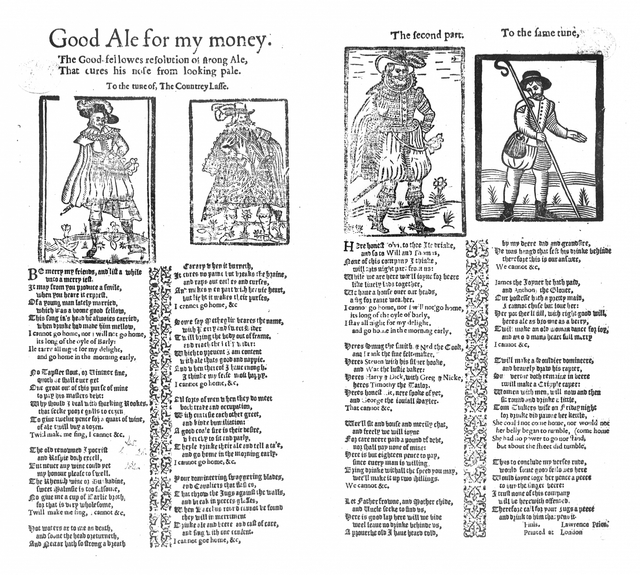
“Good Ale for my Money” English Broadside Ballad Archive, Roxburghe collection by permission of The British Library
It is amazing that any of these broadside ballads survive. They were cheap and ephemeral products, and often ended up being used as kindling or toilet paper when they became worn and unreadable, or when their songs fell out of favor. Thankfully, a handful of gentlemen collectors—most notably Samuel Pepys—took an interest in these manifestations of “low” culture that many of their peers found vulgar, and carefully pasted their purchases into bound volumes that have survived to the present.
The drinking songs amongst these surviving ballads are a unique form of evidence for answering questions about the character and meanings of seventeenth-century drinking culture. They often contained warnings about the types of companion to avoid, or extrapolated the qualities of the ideal drinking companion:
Roome for a lusty lively Lad,
dery dery downe,
That will shew himselfe blyth be he ne’re so sad,
dery dery downe,
That cryes a fig for poverty
And takes all troubles patiently,
Will spend what he gets,
And drinke more then he eates,
That never meanes to vary
From good fellowship free,
If thou such a one be.
Ile drinke to thee kinde Harry.
Some contained drinking games within them, with each verse including instructions for more mugs to be fetched and drained, with drinkers/singers getting through thirteen helpings of beer by the end of the song!
Be merry my hearts, and call for your quarts,
and let no liquor be lacking,
We have gold in store, we purpose to roare,
untill we set care a packing.
Then Hostis make haste, and let no time waste,
let every man have his due,
To save shooes and trouble, bring in the pots double
for he that made one, made two.
…
Then Hostesse go fetch us some, for till you do come
we are of all joyes bereaven,
You know what I meane, make haste come again,
for he that made ten, made eleven.
…
Then Hostesse lets know, the summe that we owe,
twelve-pence there is for certaine,
Then fill tother pot, and heres money fort
for he that made twelve, made thirteene.
Other songs attacked those who refused to engage in bouts of alehouse jollity as covetous misers, whose individualistic worldview posed a threat to communal solidarity:
There’s many men get store of treasure
yet they live like very slaves:
In this world they have no pleasure
the more they have, the more they crave.
Hang such greedy-minded misers,
that will ne’r contented be.
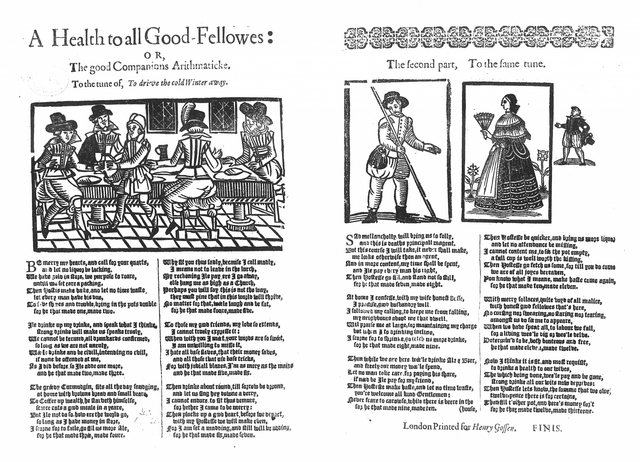
“A Health to All Good-Fellowes” English Broadside Ballad Archive, Roxburghe collection by permission of The British Library
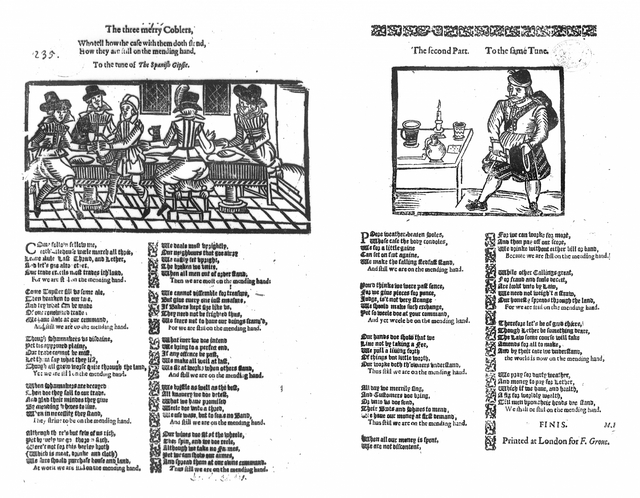
“The three merry Coblers” English Broadside Ballad Archive, Roxburghe collection by permission of the British Library
These songs can be read and analyzed to reconstruct the key features of seventeenth-century English drinking culture and the broader societal values and assumptions that underpinned it, and doing precisely this has formed a large part of my historical research.
There is a major problem here though: these songs don’t really survive at all. I can sit at my desk and read their words, but this is hardly giving me access to how these words would have been experienced by early modern drinkers. I sit quietly, alone, peacefully reading and reflecting on a ballad. They would have huddled around an ale bench, shoulder-to-shoulder with drinking companions, and bellowed out these words—they would have heard these songs as much as they read them.
Historians that have worked on broadside ballads have not been deaf to this aspect of their source material, and attempts have been made to recover something of their sound. Most of these songs specified the tune to which they should be sung, and it has been possible to reconstruct many of these melodies. The creators of the English Broadside Ballad Archive, a free online database of surviving seventeenth-century ballads, have even had a go at singing the ballads along to their tunes and recorded the results. Take a moment to listen to their version of the drinking ballad “A Messe of good Fellows.”
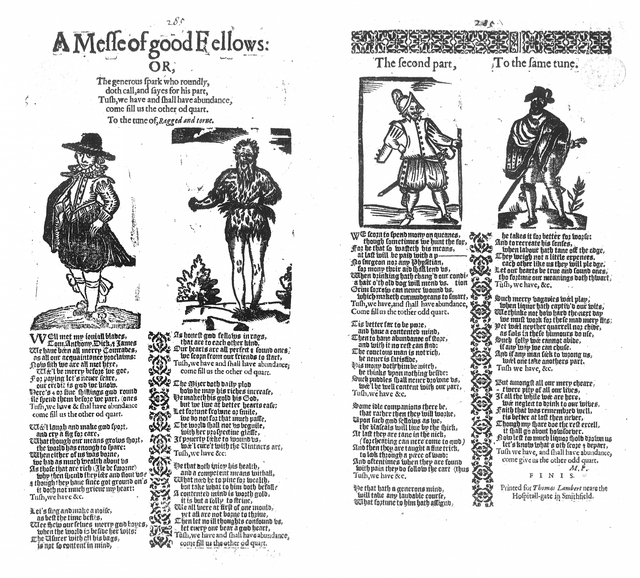
“A Messe of good Fellows” English Broadside Ballad Archive, Roxburghe collection by permission of The British Library
“A Messe of good Fellows”
This is a fabulous resource, but I can’t help feel that this still falls short of capturing the way drinking songs were experienced by alehouse-goers. It gives us a sense of how the tunes were simple and catchy, designed as much as a mnemonic device as an aesthetic one. It may also assist imaginative efforts to hear the lone-voice of a ballad singer in the street—though even for this purpose it is perhaps too polished, as one seventeenth-century writer complained that ballad sellers’ voices tended to be “as harsh a noise as ever Cart-wheel made.” It certainly doesn’t capture the atmosphere we would expect to accompany an alehouse ballad performance, for which we might imagine background noise, rhythmic hand-clapping, and massed voices for the chorus.
We might also expect instrumental accompaniment. It was common for fiddlers to perform in alehouses, particularly on special occasions. Drumming might be heard, as it was in Glastonbury’s Ship Inn one night in 1657, when a gentleman who had planned to lodge with a friend there overnight had a change of heart due to the presence of “a disorderly company ranting and drinking and drumming,” who “beat the drum all night [such] that the neighbors were much disturbed and could not sleep.” In another raucous drinking bout in a 1609 Cheshire alehouse, one drinker repeatedly blasted a trumpet to “call together all the drunkards.”
The sound of a drinking song is likely then to have been much more vibrant and boisterous than the sound evoked by listening (alone at a desk) to the recordings offered by the English Broadside Ballad Archive, however innovative a resource they are. There are other problems here, of course, that even an attempt to create a recording that more closely evoked an alehouse atmosphere would not overcome. One is that a ballad would not only have been sung or listened to—it would have been a performance to be seen as well. A wink or a nod to accompany certain lines, or a sideways glance or grin at a drinking companion, could have transformed the meanings of the lines being delivered, something which will forever be lost to the historian.
And then, of course, there is the issue of drunkenness. Even if we replace the practice of sitting quietly at a desk reading a ballad with sitting at a desk listening to a recording of a ballad and trying hard to imagine drums, trumpets, and raucous merriment, the average historian (one would expect) is still going to be sober. The drinking song experience was not. A beer at lunchtime might help, but the levels of intoxication that would accompany the drinking song experience might again exert considerable influence on a song’s meaning, as humor and camaraderie become enhanced and exaggerated.
In other words, simply hearing a recording of a ballad drinking song may not take us very much further towards recovering the way it was experienced than reading it does. Again, ballad scholars have not ignored this, and efforts have been made at various ballad conferences to try to create a performative atmosphere through collective singing, sometimes with alcohol involved. I haven’t yet had this experience myself—though I will at a conference next spring—but I already have one major reservation (other than being hopeless at singing) about what this can achieve. A group of academics closely analyzing every aspect of the dynamics is hardly likely to create an authentic or natural atmosphere: the whole thing is likely to be too self-conscious.
How, then, can the historian intent on ‘hearing’ their source material get closer to doing so? I’m not sure we can, but if the answer lies anywhere then I’m fairly sure it cannot be found at my desk. Arguably my greatest insight into the experience of the seventeenth-century drinking song came not from a recording, nor any sort of forced imaginative effort. It came when attending a recent English football match. Standing shoulder-to-shoulder with fellow supporters of Bristol City, I heard the slow, repetitive beat of a drum, and a lone voice projecting the words to a familiar exhortation of our team’s quality.
Gradually, those around me took up the song—a few knew all the lines, most could bellow out the chorus—and we worked our way through a boisterous rendition, complete with well-worn jokey asides, reaching a crescendo that delivered with it a swelling sense of collective solidarity and camaraderie. It was, admittedly, an almost exclusively masculine experience, but this too had echoes of many an alehouse drinking bout of the seventeenth century.
And crucially, of course, we were all drunk. I’d experienced this many times before, but not before had I made the connections between those imaginative efforts at my desk and these cold Saturday afternoon experiences away from it.
I could be wrong: the experience of a twenty-first-century English football song and the experience of a seventeenth-century English drinking song might be some distance apart. Yet it seemed there were greater parallels between these two experiences than there were between some of my more detached academic attempts to ‘hear’ the songs of the past and how those songs were actually experienced. I’m generally wary of letting personal experience stand in for historical knowledge based on a reading of source material, but when we try to recover aspects of the past that no amount of reading can achieve, we have to open our minds to approaches that transcend the more conventionally academic.
Listening to the past is a step in the right direction, but when this too is done in a detached and reflective way in the comfort of an office, seminar room, or conference gathering, we are still missing something—something that we may need to move further away from our desks to get close to.
All together now…
(To the tune of “Land of Hope and Glory”)
“We all follow the City,
Over Land and Sea,
We all follow the City,
On to Victory”

